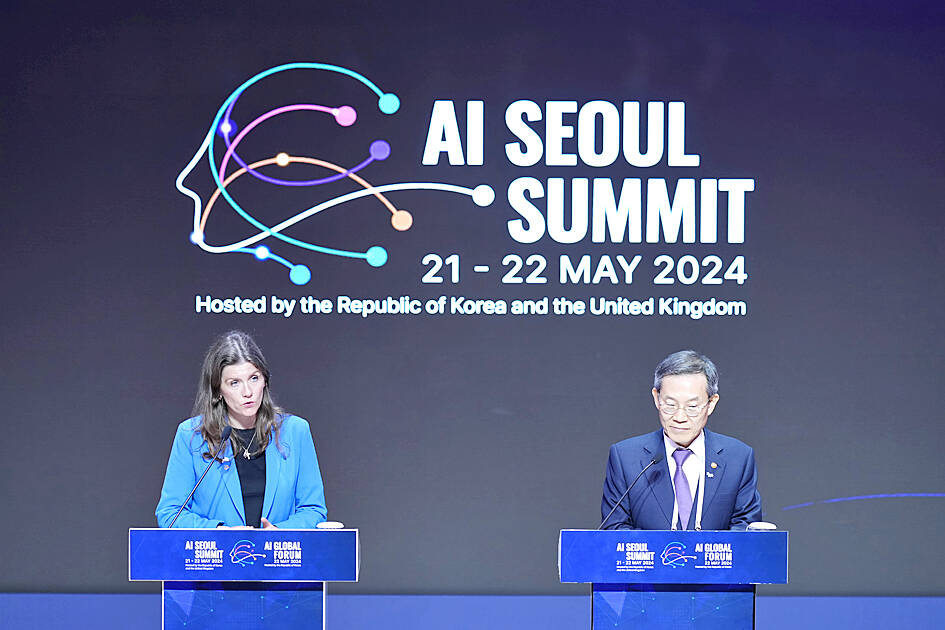Some of the world’s biggest tech companies pledged to work together to guard against the dangers of artificial intelligence (AI) as they wrapped up a two-day AI summit, also attended by multiple governments, in Seoul.
Sector leaders from South Korea’s Samsung Electronics Co to Google promised at the event, cohosted with the UK, to “minimize risks” and develop new AI models responsibly, even as they push to move the field forward.
The fresh commitment, codified in a “Seoul AI Business Pledge” yesterday, plus a new round of safety commitments announced the previous day, build on the consensus reached at the inaugural global AI safety summit at Bletchley Park in England last year.

Photo: AP
Tuesday’s commitment saw companies, including OpenAI and Google DeepMind Technologies, promise to share how they assess the risks of their technologies — including those “deemed intolerable” and how they would ensure such thresholds are not crossed.
However, experts said it is hard for regulators to understand and manage AI when the sector is developing so rapidly.
“I think that’s a really, really big problem,” said Markus Anderljung, head of policy at the Centre for the Governance of AI, a non-profit research organization based in Oxford, England.
“Dealing with AI, I expect to be one of the biggest challenges that governments all across the world will have over the next couple of decades,” Anderljung said. “The world will need to have some kind of joint understanding of what are the risks from these sort of most advanced general models.”
UK Secretary of State for Science, Innovation and Technology Michelle Donelan yesterday said in Seoul that “as the pace of AI development accelerates, we must match that speed ... if we are to grip the risks.”
There would be more opportunities at the next AI summit in France to “push the boundaries” in terms of testing and evaluating new technology, she said.
“Simultaneously, we must turn our attention to risk mitigation outside these models, ensuring that society ... becomes resilient to the risks posed by AI,” Donelan said.
The stratospheric success of ChatGPT soon after its 2022 release sparked a gold rush in generative AI, with tech firms around the world pouring billions of dollars into developing their own models.
Such AI models can generate text, photographs, audio and even video footage from simple prompts, and its proponents have heralded them as breakthroughs that would improve lives and businesses around the world.
However, critics, rights activists and governments have said that they can be misused in a wide variety of ways, including the manipulation of voters through “deepfake” pictures and videos of politicians.
Many have called for international standards to govern the development and use of AI.
“I think there’s increased realization that we need global cooperation to really think about the issues and harms of artificial intelligence. AI doesn’t know borders,” said Rumman Chowdhury, an AI ethics expert and founder of Humane Intelligence, an independent non-profit that evaluates and assesses AI models.
It is not just the “runaway AI” of science fiction nightmares that is a huge concern, but issues such as rampant inequality in the sector, Chowdhury said in Seoul.
“All AI is just built, developed and the profits reaped [by] very, very few people and organizations,” she said.

The US dollar was trading at NT$29.7 at 10am today on the Taipei Foreign Exchange, as the New Taiwan dollar gained NT$1.364 from the previous close last week. The NT dollar continued to rise today, after surging 3.07 percent on Friday. After opening at NT$30.91, the NT dollar gained more than NT$1 in just 15 minutes, briefly passing the NT$30 mark. Before the US Department of the Treasury's semi-annual currency report came out, expectations that the NT dollar would keep rising were already building. The NT dollar on Friday closed at NT$31.064, up by NT$0.953 — a 3.07 percent single-day gain. Today,

‘SHORT TERM’: The local currency would likely remain strong in the near term, driven by anticipated US trade pressure, capital inflows and expectations of a US Fed rate cut The US dollar is expected to fall below NT$30 in the near term, as traders anticipate increased pressure from Washington for Taiwan to allow the New Taiwan dollar to appreciate, Cathay United Bank (國泰世華銀行) chief economist Lin Chi-chao (林啟超) said. Following a sharp drop in the greenback against the NT dollar on Friday, Lin told the Central News Agency that the local currency is likely to remain strong in the short term, driven in part by market psychology surrounding anticipated US policy pressure. On Friday, the US dollar fell NT$0.953, or 3.07 percent, closing at NT$31.064 — its lowest level since Jan.

The New Taiwan dollar and Taiwanese stocks surged on signs that trade tensions between the world’s top two economies might start easing and as US tech earnings boosted the outlook of the nation’s semiconductor exports. The NT dollar strengthened as much as 3.8 percent versus the US dollar to 30.815, the biggest intraday gain since January 2011, closing at NT$31.064. The benchmark TAIEX jumped 2.73 percent to outperform the region’s equity gauges. Outlook for global trade improved after China said it is assessing possible trade talks with the US, providing a boost for the nation’s currency and shares. As the NT dollar

The Financial Supervisory Commission (FSC) yesterday met with some of the nation’s largest insurance companies as a skyrocketing New Taiwan dollar piles pressure on their hundreds of billions of dollars in US bond investments. The commission has asked some life insurance firms, among the biggest Asian holders of US debt, to discuss how the rapidly strengthening NT dollar has impacted their operations, people familiar with the matter said. The meeting took place as the NT dollar jumped as much as 5 percent yesterday, its biggest intraday gain in more than three decades. The local currency surged as exporters rushed to